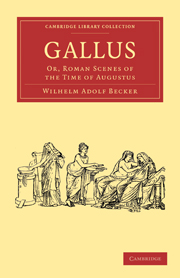Book contents
- Frontmatter
- Translator's Preface
- Author's Preface
- Contents
- ERRATUM
- SCENE THE FIRST THE NOCTURNAL RETURN HOME
- SCENE THE SECOND THE MORNING
- SCENE THE THIRD STUDIES AND LETTERS
- SCENE THE FOURTH THE JOURNEY
- SCENE THE FIFTH THE VILLA
- SCENE THE SIXTH LYCORIS
- SCENE THE SEVENTH A DAY AT BAIÆ
- SCENE THE EIGHTH THE DISPLEASURE OF AUGUSTUS
- SCENE THE NINTH THE BANQUET
- SCENE THE TENTH THE DRINKERS
- SCENE THE ELEVENTH THE CATASTROPHE
- SCENE THE TWELFTH THE GRAVE
- APPENDIX
- Excursus I Roman Marriage
- Excursus II Education
- Excursus I The Roman House
- Excursus II The Slave Family
- Excursus I The Library
- Excursus II The Books
- Excursus III The Booksellers
- Excursus IV The Letter
- Excursus V The Clocks and Divisions of Time
- Excursus I The Lectica and the Carriages
- Excursus II The Inns
- Excursus I The Game of Ball, and other Gymnastic Exercises
- Excursus II The Gardens
- Excursus: The Dress of the Women
- Excursus: The Baths
- Excursus: The Male Attire
- Excursus I The Meals
- Excursus II The Triclinium
- Excursus III The Table Utensils
- Excursus IV The Drinks
- Excursus I The Manner of Lighting
- Excursus II The Garlands
- Excursus III The Social Games
- Excursus: The Manner of Closing the Doors
- Excursus: The Interment of the Dead
- Index
Excursus I - Roman Marriage
Published online by Cambridge University Press: 10 November 2010
- Frontmatter
- Translator's Preface
- Author's Preface
- Contents
- ERRATUM
- SCENE THE FIRST THE NOCTURNAL RETURN HOME
- SCENE THE SECOND THE MORNING
- SCENE THE THIRD STUDIES AND LETTERS
- SCENE THE FOURTH THE JOURNEY
- SCENE THE FIFTH THE VILLA
- SCENE THE SIXTH LYCORIS
- SCENE THE SEVENTH A DAY AT BAIÆ
- SCENE THE EIGHTH THE DISPLEASURE OF AUGUSTUS
- SCENE THE NINTH THE BANQUET
- SCENE THE TENTH THE DRINKERS
- SCENE THE ELEVENTH THE CATASTROPHE
- SCENE THE TWELFTH THE GRAVE
- APPENDIX
- Excursus I Roman Marriage
- Excursus II Education
- Excursus I The Roman House
- Excursus II The Slave Family
- Excursus I The Library
- Excursus II The Books
- Excursus III The Booksellers
- Excursus IV The Letter
- Excursus V The Clocks and Divisions of Time
- Excursus I The Lectica and the Carriages
- Excursus II The Inns
- Excursus I The Game of Ball, and other Gymnastic Exercises
- Excursus II The Gardens
- Excursus: The Dress of the Women
- Excursus: The Baths
- Excursus: The Male Attire
- Excursus I The Meals
- Excursus II The Triclinium
- Excursus III The Table Utensils
- Excursus IV The Drinks
- Excursus I The Manner of Lighting
- Excursus II The Garlands
- Excursus III The Social Games
- Excursus: The Manner of Closing the Doors
- Excursus: The Interment of the Dead
- Index
Summary
A FAMILY is a domestic society consisting of persons, either bound together by natural ties, or adopted into it on certain conditions. Among the Romans, and indeed the ancients generally, there was a third component part, namely, the slaves; who, as the property of the master, were embodied into his family; and it is from this lowermost class that the whole united body derives its name. For though familia has been deduced from the Greek όμιλία, as well as the Oscan famel, famul, famulus; yet the latter derivative only, adopted also by Festus, v. 65, can lay claim to authenticity; and it is evident that the Romans themselves were of this opinion, from passages such as Plautus, Mil. ii. 3. 80.
Familia, then, originally denoted a certain number of slaves That it was a fixed number, can hardly be inferred from Appulei. Apol. 504, but certainly a plurality must be supposed. Cicero, Cœc. 19. Comp. Ulp. Dig. L. 16, 40, ne duo quidem. Afterwards, however, it denoted the whole body of the domestic society; the free with their slaves, the pater familias (which name does not indicate him as the father, but as the superior of the house, Paul. Dig. L. 16, 195,) standing at their head.
In this sense, the condition of the existence of the family is marriage, it matters not in what form, whether the bond be drawn tighter or looser, provided it be the union of two persons of different sexes, ad individuam vitœ consuetudinem.
- Type
- Chapter
- Information
- GallusOr, Roman Scenes of the Time of Augustus, pp. 171 - 178Publisher: Cambridge University PressPrint publication year: 2010First published in: 1844



